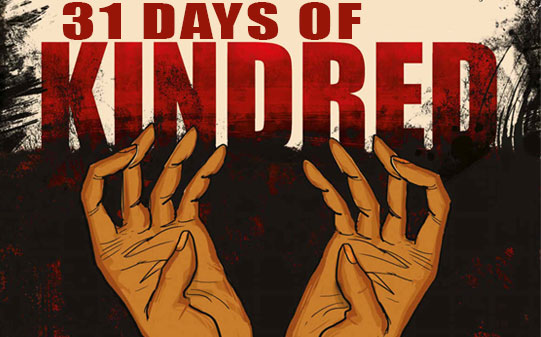The graphic novel adaptation of Octavia E. Butler’s Kindred that I wrote/lettered and John Jennings drew will be released by Abrams ComicArts on January 10, 2017 (available for pre-order now). In recognition of that momentous occasion, I’m writing 31 blog posts about the path from novel to graphic novel. This is 31 Days Of Kindred.
* * *
Day 18
Rewrite
* * *
“A place like this would endanger him in a way I didn’t want to talk to him about. If he was stranded here for years, some part of this place would rub off on him. No large part, I knew. But if he survived here, it would be because he managed to tolerate the life here. He wouldn’t have to take part in it, but he would have to keep quiet about it. Free speech and press hadn’t done too well in the antebellum South. Kevin wouldn’t do too well either. The place, the time would either kill him outright or mark him somehow. I didn’t like either possibility.” Kindred, p. 77
At this point in the novel, Dana worries that her white husband will be harmed by living in the 19th century, not because of the constant physical danger Dana’s skin places her in, but because of the complicity he would have to accept.
It’s easy to read about the past and imagine yourself as an anachronistic hero, resisting the evils of history that so beset our ancestors. It’s that sort scenario that Dana and Kevin Franklin face in their travels to the past. Initially, they behave like “actors” watching a show without taking part. Eventually, Dana starts teaching slaves to read and Kevin plays a part in the underground railroad. As Lauren Davis notes:
“Kindred has no Hitler to kill. Our narrator Dana and her husband Kevin can’t end slavery; they can only try to survive this dark chapter in American history. Similarly, we as modern readers can’t rewrite the events of the past; we can only share a fraction of Dana and Kevin’s horror as they experience racism and dehumanization firsthand.”
But the sad, inescapable truth is, while we can’t rewrite the events of the past, we can keep past events from repeating and extending into the future. That’s some complicity we can’t shrug off. Because, while slavery may have technically ended with the Civil War, racism and dehumanization are still front and center in the U.S. And, increasingly, it seems like free speech and press, critical of racism, sexism, and fascism aren’t doing to well in the cacophony of anger, ignorance, and unthinking nationalism.
At one point in the novel (a part we couldn’t fit into the graphic novel, sadly) Rufus comes across an American history book Dana’s brought with her from 1976. Rufus dismisses it as abolitionist propaganda.
For some reason today–maybe I just need to stay off social media–these scenes resonate. I read stories about a couple professors whose anti-Trump, or anti-white nationalist statements earned them the ire of the people who flood you with death threats and clever ripostes about “libtards” and “cucks.” I see people in power talking about internment camps for Muslims and licking their lips over the chance to erode civil rights. I hear politicians reject climate scientist as environmentalist propaganda, and I wonder if Dana was the only one being flung backwards in time.
—
In happier news, check out a preview of Kindred: A graphic novel adaptation on the Huffington Post!

